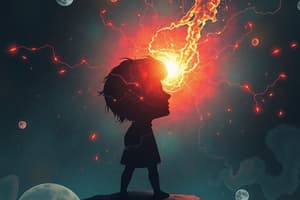Podcast
Questions and Answers
What is the main characteristic of retrograde amnesia?
What is the main characteristic of retrograde amnesia?
- Inability to remember any past events
- Inability to form new memories after a specific event
- Loss of memories that precede a specific event (correct)
- Selective loss of short-term memories
Which factor is NOT listed as a potential cause of amnesia?
Which factor is NOT listed as a potential cause of amnesia?
- Alzheimer's disease
- Diabetes (correct)
- Stroke
- Traumatic brain injury (TBI)
What type of evaluation involves assessing cognitive abilities and memory functioning?
What type of evaluation involves assessing cognitive abilities and memory functioning?
- Structural imaging
- Functional imaging
- Neuropsychological evaluation (correct)
- Psychological evaluation
Which treatment approach focuses on improving memory functioning through teaching compensatory strategies?
Which treatment approach focuses on improving memory functioning through teaching compensatory strategies?
In anterograde amnesia, what type of memories are affected?
In anterograde amnesia, what type of memories are affected?
Flashcards are hidden until you start studying
Study Notes
Neurological Symptoms: Memory Loss and Amnesia
Memory is a fundamental aspect of our minds, allowing us to store and retrieve information, learn from our experiences, and maintain our sense of identity. When memory becomes compromised, it can be a troubling sign of neurological issues. In this article, we'll explore memory loss and amnesia, two conditions that often arise in connection with neurological symptoms.
Memory Loss and Its Types
Memory loss, or amnesia, can vary in its severity, scope, and causes. There are three main types of memory that can be affected:
-
Short-term memory (STM) – This type of memory is responsible for retaining information for a brief period, usually a few seconds or minutes. Short-term memory is crucial for everyday functioning, enabling us to remember phone numbers we've just heard and perform mathematical calculations.
-
Long-term memory (LTM) – Long-term memory stores information for much longer periods, often years or even a lifetime. LTM is divided into two subcategories:
- Declarative memory – Declarative memory is responsible for storing facts and events. For instance, the capital of France or the day you graduated from college are declarative memories.
- Procedural memory – Procedural memory allows us to learn and perform new skills, such as riding a bike or playing an instrument.
-
Working memory – Working memory refers to the capacity to hold and manipulate information that is needed for complex cognitive tasks, such as problem-solving or reading comprehension.
Amnesia and Its Causes
Amnesia occurs when memory loss is severe and impacts daily life. There are two main types of amnesia:
-
Retrograde amnesia – Retrograde amnesia refers to the loss of memories that precede a specific event, such as a traumatic injury or a stroke. In this type of amnesia, memories from both short-term and long-term periods before the event are affected.
-
Anterograde amnesia – Anterograde amnesia involves the inability to form new memories after a specific event. In contrast to retrograde amnesia, anterograde amnesia does not affect memories formed before the event.
Amnesia can be caused by various factors, including:
- Traumatic brain injury (TBI)
- Stroke
- Tumors
- Alzheimer's disease
- Epilepsy
- Encephalitis
- Exposure to toxins or drugs
- Electroconvulsive therapy (ECT)
- Neurodegenerative diseases, such as Parkinson's and Huntington's
Assessment and Treatment
Memory loss and amnesia can be diagnosed through a variety of tests and assessments, such as:
- Neuropsychological evaluation – This evaluation involves assessing cognitive abilities and memory functioning.
- Structural imaging – Magnetic Resonance Imaging (MRI) and Computerized Tomography (CT) scans can help reveal structural abnormalities in the brain.
- Functional imaging – Functional Magnetic Resonance Imaging (fMRI) and Positron Emission Tomography (PET) scans can provide information about brain activity and blood flow, which can help identify areas of the brain associated with memory loss.
Treatment options for memory loss and amnesia depend on the cause, severity, and type of amnesia. Some common approaches include:
- Rehabilitation – Memory rehabilitation programs can help improve memory functioning by teaching compensatory strategies and techniques.
- Medication – Medications, such as cholinesterase inhibitors, can help treat memory loss in some neurological conditions, such as Alzheimer's disease.
- Psychotherapy – Cognitive-behavioral therapy (CBT) and other psychological interventions can help improve memory and coping skills.
- Lifestyle modifications – Engaging in mentally stimulating activities, such as puzzles and brain games, can help improve cognitive function.
In conclusion, memory loss and amnesia are complex and multifaceted conditions that can have a profound impact on daily life. Understanding the various types of memory and amnesia, their causes, and treatment options is crucial for improving the lives of individuals living with these conditions.
Studying That Suits You
Use AI to generate personalized quizzes and flashcards to suit your learning preferences.




